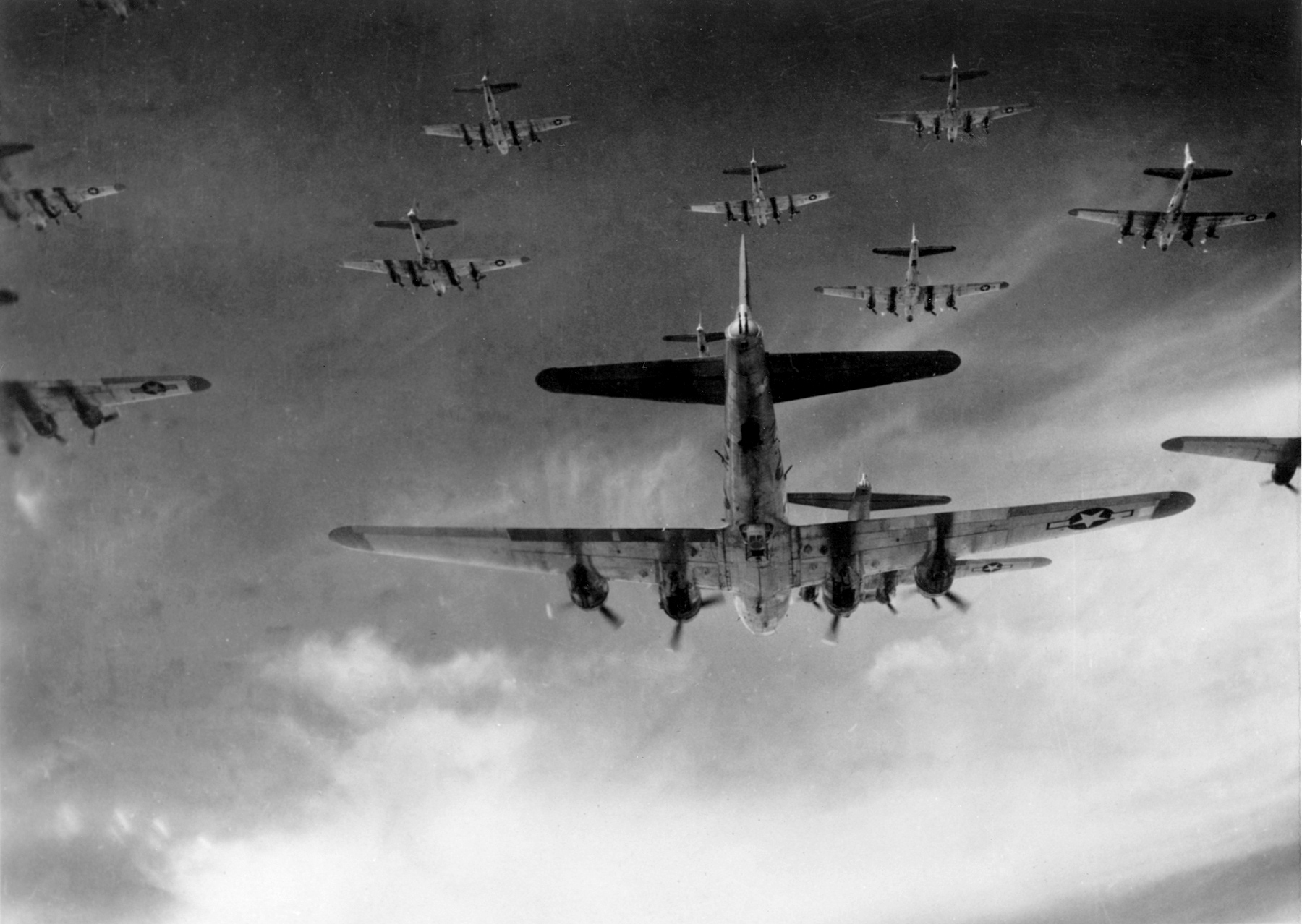
Airpower enthusiasts have always faced three significant difficulties when it comes to converting unbelievers to their cause. Two of these have their antecedents deeply rooted in what occurred during the Second World War; the origin of the third objection is far subtler. In the light of Andrew Davies’ recent post, in which he unequivocally demonstrated the terrible effectiveness of the air offensive, it would seem worthwhile re-examining the actual record of strategic bombing.
Advocates have always held out the seductive idea that airpower could achieve victory without getting involved in a long, drawn out land campaign. It was, ironically, the mismatch between this vision and the far more limited accomplishments of strategic bombing that was the source of early disillusionment about its effectiveness. Although Germany suffered a great deal of destruction in the years before mid-1944, the air offensive was extremely costly in terms of resources. Additionally (and perhaps most crucially) it failed to significantly cripple the German war effort. It hadn’t lived up to its promises.
Then, in the final year of the war and just as the air campaign was beginning to achieve its long-promised results—the invasion of France stole the oxygen of publicity from the airmen. Indeed, after witnessing the tactical effectiveness of strategic bombers (the ones that didn’t miss the target and kill Allied troops) generals became reluctant to allow the aircraft to return to their strategic role. They wanted to task the bombers for operational missions. Even the most senior officers had no real understanding of the extent and effectiveness of the campaign.
That’s why production of the US Strategic Bombing Survey was not simply an attempt to determine the effectiveness of air operations: it was also part of a post-war attempt to
prove airpower worked. Of course nobody was much surprised to discover bombing was destructive. After all, they’d seen the devastated cities of Germany with their own eyes. The point was that it was impossible to draw a direct link between the bomber offensive and the collapse of the Wehrmacht—the German military itself. This was the aim of the survey. It would offer irrefutable evidence to the skeptics.
Except the other services had no intention of allowing facts to get in the way of their own, institutional requirements to ensure they continued to receive a healthy share of the budget allocation. After all, they insisted, even in January 1945 the German army had remained capable of launching a significant (if ultimately futile) offensive in the Ardennes while at the same time holding ground on the eastern border (although this was considerably assisted by Stalin’s desire not to push straight on to Berlin). The generals and admirals insisted that airpower alone could never be decisive, regardless of the survey’s findings. It seemed that only boots on the ground could ensure victory.
Using these arguments the other services punctured the overblown claim that strategic bombing alone could be decisive. It’s difficult not to suspect that inter-service rivalry and jockeying for resources still continues to play an important role in the ongoing debate over the role of airpower.
In this regard, the Army’s commander, General David Morrison, is just the latest
contributor to the debate. I’m certain he is utterly committed, intellectually, to the case he makes so forcefully on the enduring primacy of ground forces. Nevertheless, his argument can be deconstructed in two ways. There’s the appeal, firstly, for greater spending on defence but there’s also an element of special pleading. He wants to ensure the central role of the soldier in the foxhole (or peacemaker in the Pacific, or special forces trooper assaulting where a bomb can’t go) is not forgotten.
The argument over the utility of airpower won’t been settled by either examples of its success (the Bosnian conflict); apparent success but ultimate failure (Gulf War Mark 1); nor its failure (the drone bombing of Pakistan has failed to defeat the Taliban insurgency—no matter how many ‘terrorists’ have been killed). The result is a continuing theoretical battle over the utility of specific weapons systems and operational techniques. It’s similar to the debates, before the First and Second World Wars respectively, between those who believed that the offensive spirit would always trump the defensive or that the horror of bombing would lead citizens to demand their politicians to sue for peace.
Technology has changed dramatically over the past decade. It would be surprising if these transformations don’t result in similar, radical upheavals in the way war will be fought in future. There’s a real need, today, to stand back and objectively examine this new reality. Hopefully the analysis will be engaged in without preconceptions based on which service is likely to emerge with a greater share of the seemingly inexorable shrinking resource pie.
Nic Stuart is a columnist with the Canberra Times. Image courtesy of United States Air Force. Print This Post
Print This Post